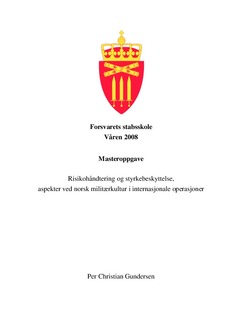| dc.description.abstract | Instrumental employment of military force has become commonplace for western countries with an increased focus on security and risk management, since the end of the cold war. In Norway this has lead to a renewed focus on the military profession. Today Army soldiers risk their lives more often than before in missions, remote from own territory, population, culture, history and traditions. The expression “saving a stranger” is often used. How do the Norwegian armed forces cope with risk under these changed conditions? This study is aiming at illuminating some vital characteristics of Norwegian military culture in international operations, including Risk Management and Force Protection, furthermore, how military ethics and leadership influence these aspects. Seven Norwegian army officers with fresh experience as commanders in various international operations have been interviewed for this Master Thesis. Generally they consider Norwegian military forces to be pragmatic and efficient, employing limited resources as best possible. High ambitions, high competence and flexibility are mentioned as characteristics. They believe Norwegian military culture has changed somewhat during the last decade. However part of the mindset and approach from the traditional peace support operations, are still valid. The Norwegian military approach to Risk Management is serious and sensible. Emphasize is put on situational awareness and pro-activeness and the commanders stress the significance of keeping focus on the tasks assigned. The commanders prefer soft Force Protection measures, which encourage dialogue and communication within the mission area. However, they point out the importance of flexibility, enabling to escalate the Force Protection measures if necessary. The commanders did not experience any major ethical dilemmas during their tour of duty, nevertheless the feeling of being personal liable for the assigned forces in a high risk environment was at times challenging. Again keeping focused on the mission and the tasks assigned were helpful. Generally the commanders experienced no undesired constraints or guidance from any higher national political or military authorities, or from others outside the armed forces. They were trusted to manage risk and provide the best suitable force protection within their command and control limits. | en_US |
